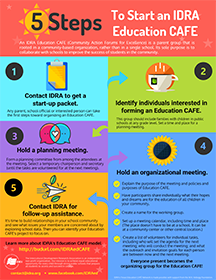• by Aurelio M. Montemayor, M.Ed. • IDRA Newsletter • January 2019 •


For example, in 2011 when the Texas legislature cut billions off the education budget, families were alarmed and began taking public action to pressure the state legislature to put the money back in the school coffers.
And when a bill was passed in 2017 that weakened the high school graduation requirements and removed critical requirements of all students, such as Algebra II, one large community requested specific training from IDRA on the issue. They then conducted a survey of more than 1,600 families, produced a report and still today holds yearly conferences to assess whether families are informed and know if their secondary students are on a college track (Cortez, 2015).
Learn more about IDRA’s Education CAFE approach!
An Education CAFE is a parent group that is rooted in a community-based organization, rather than in a single school. Its sole purpose is to collaborate with schools to improve the success of students in the community. Three components are central to the Education CAFE:
- Community-based, Distributive Leadership – Education CAFEs are born in their communities.
- School Partnerships – Members come together and partner with schools in their neighborhood in order to ensure student success.
- Education Projects – Members carry out education projects using actionable data.
IDRA’s family leadership approach, as seen in our Education CAFE work and our school change model, the Quality Schools Action Framework, gives actionable data and information a prominent role. Data are important but only to serve the interest and drive of the families to have excellent schools for all children.
Our experience with families and communities also informs our processes. We have seen countless attempts by school officials to dump data at parent meetings without first listening to what parents are most concerned about. To simply present data, no matter how critical and important we might consider it, without being attentive to the participants’ interests, is to misunderstand what being “data driven” means. In the vast information databases collected by federal and state agencies and others, we must mine for what is relevant and current.
The community project selected by the group is constructed as we bridge the data with families’ concerns and interests. The data that drives family leadership in education projects must resonate with the families and be a catalyst for action.
Resources
Cortez, J.D. (June-July 2015). “¿Y Ahora Qué? And Now What? – Community Groups in South Texas Work Together to Improve Education,” IDRA Newsletter.
Aurelio M. Montemayor, M.Ed., is an IDRA senior education associate and directs IDRA Education CAFE work. Comments and questions may be directed to him via email at aurelio.montemayor@idra.org.
[©2019, IDRA. This article originally appeared in the January 2019 IDRA Newsletter by the Intercultural Development Research Association. Permission to reproduce this article is granted provided the article is reprinted in its entirety and proper credit is given to IDRA and the author.]


